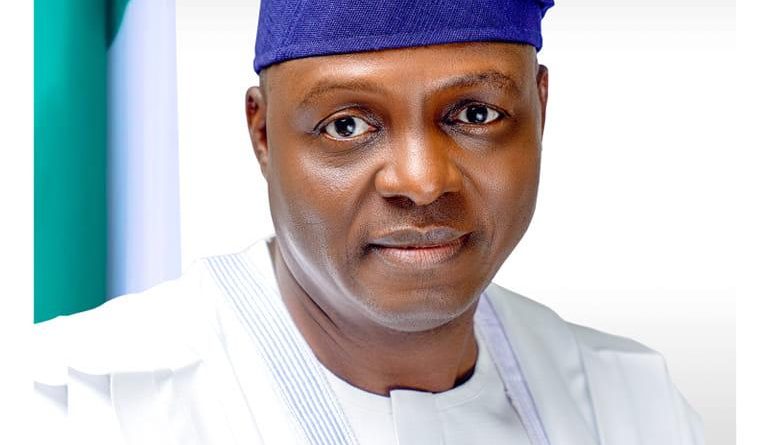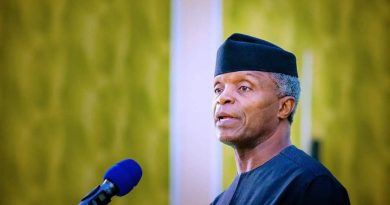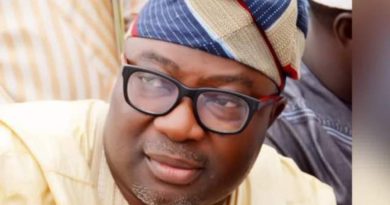Yilwatda’s Strategic Election And The Daunting Task Ahead-By Tunde Rahman
“Yilwatda’s election is significant on many fronts. At 57, he represents a younger, dynamic generation of leaders. His election signals a deliberate move towards inclusivity, affirming the party’s commitment to integrating youth into leadership positions”
Nentawe Goshwe Yilwatda may not roll easily off the tongue or be instantly recognisable to many Nigerians. Its provenance is the Ngas ethnic stock, also known as Angas, in Plateau State, which produced the late Joseph Gomwalk, the first military governor of the defunct Benue-Plateau State. Yilwatda hails from Dungung, Kanke Local Government Area of Plateau.
Although Yilwatda, the newly-elected National Chairman of the All Progressives Congress (APC), cannot be described as a political veteran, his journey in public service began in earnest when he was appointed Resident Electoral Commissioner (REC) for Benue State in 2017, a position he held until 2021. His name further gained prominence when he became the APC’s Governorship Candidate in Plateau State during the 2023 elections, followed by his service as Minister of Humanitarian Affairs and Poverty Reduction in the current administration.
Paradoxically, Yilwatda’s relative newness to partisan politics—unencumbered by political baggage—has become his greatest asset. His emergence as the new APC National Chairman at the 14th National Executive Committee (NEC) meeting on July 25 in Abuja, following his unanimous endorsement to succeed Dr. Abdullahi Umar Ganduje, reflects a strategic political calculation.
Yilwatda’s election is significant on many fronts. At 57, he represents a younger, dynamic generation of leaders. His election signals a deliberate move towards inclusivity, affirming the party’s commitment to integrating youth into leadership positions. Among APC’s past chairmen—from Chief Bisi Akande to Ganduje—only Yilwatda and Governor Mai Mala Buni of Yobe fit this younger demographic.
Yilwatda’s emergence addresses the sensitive issue of religious and regional balance at the party’s top echelon. As a Christian from the North-Central zone, his emergence restores the original zoning arrangement, which had allotted the APC chairmanship to the region but was disrupted after Senator Abdullahi Adamu’sexit. With his elevation, the North-Central’s rightful place has been restored.
In politics, some issues are not as straightforward as they appear. Actions motivated by the best intentions are often misconstrued – sometimes deliberately. For instance, some critics have tried to frame Yilwatda’s appointment as a sign that President Bola Tinubu intends to retain the Muslim-Muslim ticket for 2027. And one may ask, if it’sn’t broken, why fix it, as Americans would say. The Muslim-Muslim ticket is working, has not ruptured religious harmony and has not turned the country into an Islamic state as some had initially feared.
In any case, such insinuations ignore that the APC chairman comes to the job eminently qualified with a rich resume. He brings a wealth of experience, knowledge, innovation and a sense of responsibility to the job. He is an intellectual. Before working as REC and contesting for the Plateau gubernatorial election, he qualified as a Professor of Electronic and Computer Engineering. His people, who believed in his competence and capacity, had tapped him for the governorship in 2023.
Yilwatda has his job cut out for him. He is to ensure the digital registration of party members, leading to a codified party membership register, and facilitate the proper integration of defecting politicians into the APC. President Tinubu had harped on the need for the party to retain its inclusive outlook, urging the chairman to remain open to new members and fresh ideas.
Convinced that the strength of any party lies in its membership, in expanding its ranks to accommodate new members, the President encouraged the chairman to consider setting up a small group from the National Working Committee to visit states and ensure that all members are seamlessly registered and integrated.
But there is one other tough job for Yilwatda: restoring credibility, discipline and party supremacy, and ensuring internal democracy within the APC rank and file. This critical matter may prove a herculean task – or an Achilles’ heel. He needs every fibre in him to navigate the bumpy path towards creating a more disciplined, more efficient APC, in short, a new APC. Yilwatda needs wisdom and tact to pull this through. A bridge between the old and the new, Yilwatda will need exceptional focus to accomplish the task.
Indeed, the new chairman has come when the APC urgently needs reform and recalibration. Party primaries for picking candidates for elections into the governorship of Ekiti, Osun, and Anambrawill soon be conducted. As the man in the saddle, Yilwatda must be firm, resolute and incorruptible.
Yilwatda may not have spent decades in the political mill, but those who know him say he is firm and tenacious. His stoic Christian background has prepared him for difficult times. Son of a highly revered pastor, Reverend Toma Yilwatda, the new APC chairman’s character was formed from his elementary school days at Boys’ Secondary School, Gindiri, a missionary school.
From an early age, he had reportedly demonstrated a keen intellect and an unwavering commitment to excellence. His academic odyssey includes a first degree earned from the Federal University of Agriculture, Makurdi, a Master’s degree from ATBU, Bauchi, and a doctorate from the University of Nigeria, Nsukka, specialising in Electronic and Computer Engineering.
His brilliance and dedication earned him a place at his alma mater, the Federal University of Agriculture, Makurdi, where he served for over 26 years. His expertise and leadership propelled him to the position of the University’s pioneer Director of ICT, where he led transformative digital reforms that automated key institutional processes.
Beyond academia, Prof. Yilwatda has played a pivotal role in the digital transformation of Nigeria’s public and private sectors. His consultancy work spans multinational organisations and global development partners such as the European Union, UNICEF, the World Bank, and TECHVILE USA. His ability to merge technology with governance has made him a sought-after expert in digital innovation and policy development.
Yilwatda likes to refer to himself as a catalyst for change, a bridge between technology and governance, and a beacon of hope for millions striving for a better future. Will his skillset and experience help him deliver on his mandate? I strongly think so!
Rahman is Senior Assistant to the President on Media & Special Duties.




